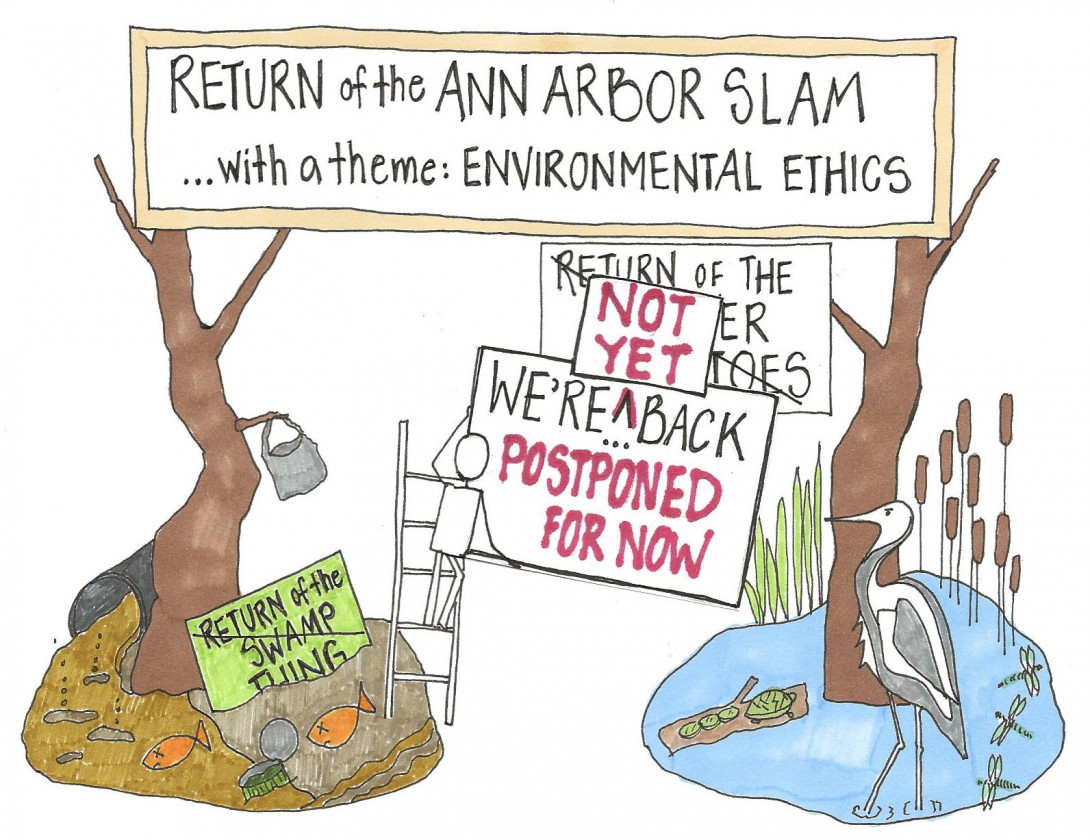2022 Ann Arbor Slam Questions
The Questions That You Might Have Considered...and Still Can On Your Own
The 2022 Ann Arbor Slam has been postponed. You can, however, talk about the questions with friends, family and colleagues.
The Slam will be back next year. Thank you for your support of this unique local community event.
2022 Big Ethical Question Slam Questions
Theme: Environmental Ethics
1. Is it morally permissible to extinguish a species?
2.Tribal nations and cities are passing resolutions and laws recognizing, for example, rivers and ecosystems as subjects of rights. Should rivers, or for that matter, nature, have moral rights?
3. Who should and what should a national park be for—in an age of overcrowding and congestion as well as wifi and Instagram?
4. Why is nature feminine? Why do we still say Mother Nature or Mother Earth? Are there any ethical reasons why we should continue to regard nature and the earth as a mother or as female?
5. Do the interests of the sport fishing community ethically conflict with the interests of nature conservation?
6. A situation I increasingly deal with in my septic tank business: An aging septic tank fails. There is untreated sewage in the yard. I know the family is living paycheck-to- paycheck. Septic systems are expensive. At the same time, there are problems of contamination and run-off into the water. What should I do in these situations?
7. Do lab-grown meats and plant-based meats pass the ethics test as the best moral choice for health, animal welfare and sustainability?
8. Is geoengineering an ethical response to the problem of climate change? What moral issues are raised by any deliberate manipulation of the climate system?
9. Do we have a moral obligation to help pets in emergencies? Under what circumstances would it be morally wrong to bring our animals with us in an emergency, such as a wildfire?
10. We included a carbon offsetting option for guests in our wedding plans. The response has been surprising. One friend wrote: “This reeks of eco-guilt. Why should I pay more to offset my emissions if it is not going to make a difference?” Is this an ethical argument? How should I respond?
11. If individuals possess a right to have children, do they also have a right to as many children as they want, without taking into account the environmental consequences of their decision?
12. Places regarded as sacred and cherished by a particular group bring up different ideas of value, especially when they are in conflict with other benefits, such as economic value for the group itself. This economic value may even mean tourism at the sacred place. What types of values do sacred places represent? Should they be retained or even restored?
13. Should voters who live in a community determine how environmental health risks, such as waste sites, are distributed? What are the ethical benefits and harms of letting voters decide?
14. Is it morally wrong for a teacher to wear an “I teach climate change” button every day to class?
15. What are the principal ethical arguments favoring and opposing community-based reparations and restorative justice programs for residents who have suffered and are still confronting environmental injustices, such as disease, air, soil, and water pollution in their neighborhoods?
16. Can you choose one virtue crucial for the sustainable life? Why this virtue—and how should a person trying to live more sustainably, demonstrate this virtue?
17. Should agricultural companies be allowed to draw 80% of the water in an area when people are running out?
18. I love chocolate. I value it even more when I know the company I get it from is ethically sourced and sustainable. Yet, do disclosure and transparency, especially when certified by a company that makes its money from this process, really make eating chocolate ethical?
19. Moral imperatives are traditionally considered as the strongest motivations we have for action. Think climate change. Today it seems as if moral arguments have no impact. What should we do when moral arguments fail?
20. If it is wrong to extinguish a species, is it right to genetically modify them? Who gets to decide?


